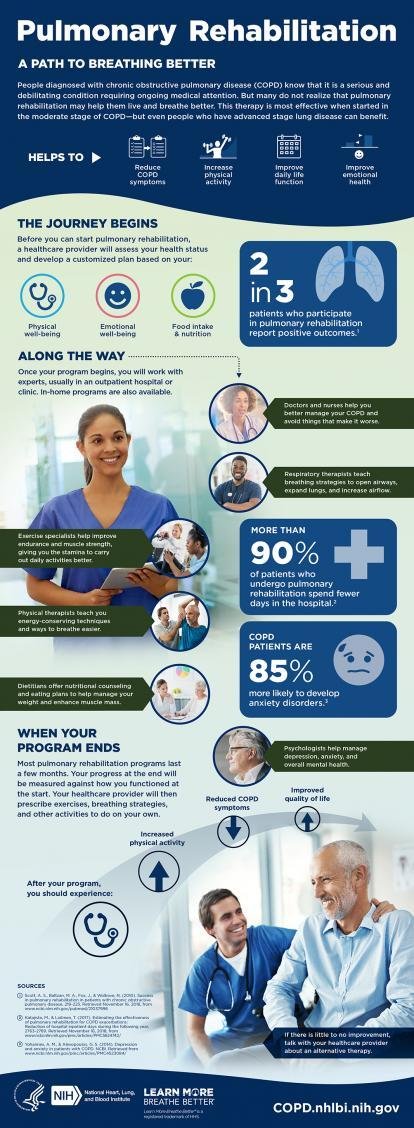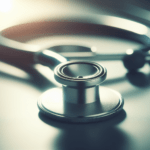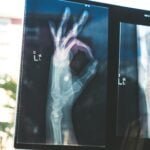
If you’re considering pulmonary rehabilitation and wondering what to expect, you’ve come to the right place. This article will give you a helpful rundown of what you can anticipate during your pulmonary rehabilitation program. From exercise routines tailored to your specific needs to education on managing your respiratory condition, we’ll guide you through the process with a friendly and informative approach. So, let’s get started and explore the world of pulmonary rehabilitation together.
Program Overview
Introduction to pulmonary rehabilitation
Pulmonary rehabilitation is a comprehensive program designed to improve the quality of life for individuals with lung conditions such as chronic obstructive pulmonary disease (COPD), asthma, or pulmonary fibrosis. This program focuses on restoring and enhancing lung function, increasing physical endurance, and providing education and support to manage symptoms effectively. It is a multi-disciplinary approach involving healthcare professionals like respiratory therapists, physiotherapists, and dietitians working collaboratively to create personalized treatment plans.
Duration and frequency of the program
The duration and frequency of pulmonary rehabilitation programs may vary depending on individual needs and the severity of the lung condition. Typically, these programs span for several weeks or months, with sessions held two to three times per week. Each session usually lasts for about one to two hours, allowing enough time for different components of the program, including exercise training, education and counseling, psychological support, and monitoring.
Goals and objectives of pulmonary rehabilitation
The primary goals of pulmonary rehabilitation are to improve the ability to perform daily activities, reduce symptoms, increase exercise tolerance, and enhance overall quality of life. Through a combination of exercise training, education, and support, pulmonary rehabilitation aims to optimize lung function, strengthen respiratory muscles, reduce breathlessness, and provide tools and techniques to manage lung conditions effectively. It also focuses on promoting psychological well-being, offering nutritional guidance, and enabling individuals to integrate rehabilitation techniques into their daily lives.
Initial Assessment
Medical history review
During the initial assessment, a healthcare professional will review your medical history in detail. This involves gathering information about your lung condition, previous treatments, medications, and any relevant underlying health issues. Understanding your medical history helps the healthcare team tailor the program according to your specific needs and identify any potential risks or limitations.
Physical examination
A thorough physical examination is conducted to evaluate your overall health and assess the impact of your lung condition on physical functioning. This examination helps the healthcare team identify any limitations, physical strengths, and areas that require attention during the rehabilitation program. It may involve assessing muscle strength, joint flexibility, balance, and coordination.
Evaluation of lung function
Lung function tests are an essential part of the initial assessment. These tests assess the capacity of your lungs to inhale and exhale air effectively. They provide valuable information about your lung condition, severity, and effectiveness of breathing. Common lung function tests include spirometry, which measures how much air you can forcefully exhale, and a six-minute walk test, which evaluates exercise tolerance and oxygen saturation levels.
Determination of baseline fitness level
To establish a starting point, your baseline fitness level is determined through various assessments. This helps the healthcare team design an individualized treatment plan and track your progress throughout the program. The assessments may include measurement of heart rate, blood pressure, oxygen saturation levels, and physical endurance tests.

Individualized Treatment Plan
Development of personalized goals
Based on the initial assessment and discussion with you, healthcare professionals will develop personalized goals for your pulmonary rehabilitation program. These goals are specific to your condition, needs, and preferences. They may include improving exercise tolerance, increasing muscle strength, reducing breathlessness, managing symptoms effectively, adopting healthy lifestyle habits, or achieving a better quality of life.
Tailoring exercises and activities
Exercise training plays a crucial role in pulmonary rehabilitation. Your treatment plan will include a variety of exercises tailored to your abilities and goals. Aerobic exercises, such as walking or cycling, help improve cardiovascular fitness and endurance. Strength training exercises target the major muscle groups, including the respiratory muscles, to enhance overall strength. Breathing exercises, such as diaphragmatic breathing or pursed-lip breathing, improve breathing efficiency and reduce breathlessness. Flexibility and range of motion exercises help improve joint mobility and flexibility.
Pharmacological interventions
In some cases, pharmacological interventions may be a part of the treatment plan. Medications such as bronchodilators, anti-inflammatory drugs, or oxygen therapy may be prescribed to manage symptoms, reduce inflammation, or improve oxygenation. The healthcare team will work closely with your primary care physician or pulmonologist to optimize medication management and ensure their integration into the overall rehabilitation plan.
Nutritional guidance and counseling
Proper nutrition plays a vital role in respiratory health. The healthcare team will offer nutritional guidance and counseling to support your overall well-being. They will provide education on healthy eating habits, weight management strategies, and specific nutritional requirements for respiratory health. Through personalized meal planning and portion control advice, they will help you make informed choices to optimize your lung function and overall health.
Exercise Training
Aerobic exercises
Aerobic exercises are essential components of pulmonary rehabilitation. These exercises involve rhythmic movements that increase your heart rate and breathing rate, leading to improved cardiovascular fitness and endurance. Some common aerobic exercises include walking, cycling, swimming, or using elliptical machines. The intensity and duration of aerobic exercises will be determined based on your fitness level and goals, gradually progressing as you build up your stamina.
Strength training
Strength training exercises help improve muscle strength and endurance, including the muscles involved in breathing. These exercises involve using resistance, such as weights or resistance bands, to challenge your muscles. The healthcare team will guide you through proper techniques and help you gradually increase the intensity and resistance of the exercises. Strengthening your respiratory muscles can significantly enhance your ability to breathe effectively and reduce breathlessness.
Breathing exercises
Breathing exercises are specifically designed to improve your breathing techniques and overall lung function. These exercises focus on diaphragmatic breathing, pursed-lip breathing, or coordinated breathing techniques. Through practicing these exercises, you can strengthen your respiratory muscles, improve oxygenation, regulate your breathing pattern, and reduce breathlessness. The healthcare team will guide you in performing these exercises correctly and incorporating them into your daily routine.
Flexibility and range of motion exercises
Flexibility and range of motion exercises are essential for maintaining joint mobility, preventing stiffness, and enhancing overall physical functioning. These exercises involve stretching major muscle groups and joints, such as shoulder, hip, and ankle joints. By improving flexibility, you can perform daily activities with ease and reduce the risk of muscle imbalances or injury. The healthcare team will guide you through a variety of stretching exercises and recommend techniques to incorporate them into your daily routine.

Education and Counseling
Understanding your lung condition
Education is a crucial component of pulmonary rehabilitation. By understanding your lung condition, its causes, and its effects, you will be better equipped to manage symptoms, make informed decisions, and actively participate in your treatment. The healthcare team will provide valuable information about your specific lung condition, its progression, and available treatment options. They will also discuss strategies to prevent exacerbations and manage symptoms effectively.
Breathing techniques
Proper breathing techniques are essential for individuals with lung conditions. The healthcare team will teach you various breathing techniques, such as diaphragmatic breathing or pursed-lip breathing, to improve breathing efficiency and reduce breathlessness. These techniques help optimize oxygen intake, regulate breathing patterns, and alleviate anxiety associated with breathing difficulties. By practicing these techniques regularly, you can apply them in real-life situations and experience significant improvements in your overall well-being.
Managing symptoms and flare-ups
During pulmonary rehabilitation, you will learn strategies to manage symptoms and cope with flare-ups effectively. The healthcare team will provide guidance on recognizing early warning signs, implementing action plans, and seeking appropriate medical attention when necessary. Through education and counseling, you will gain valuable knowledge about medication management, symptom monitoring, and lifestyle modifications to minimize the impact of flare-ups on your daily life.
Smoking cessation support
If you are a smoker, the healthcare team will provide educational resources and support to assist you in quitting smoking. Smoking cessation is essential for improving lung function, reducing respiratory symptoms, and minimizing the risk of further complications. The healthcare professionals will discuss the benefits of quitting smoking and provide strategies, such as nicotine replacement therapy or counseling, to help you successfully quit and maintain a smoke-free lifestyle.
Psychological Support
Coping with anxiety and depression
Living with a lung condition can have a significant impact on your mental well-being, leading to anxiety or depression. The healthcare team recognizes the psychological challenges associated with lung conditions and provides psychological support to address these concerns. They offer counseling services, coping strategies, and techniques to manage anxiety and depression effectively. By addressing these emotional aspects, pulmonary rehabilitation aims to enhance your overall quality of life.
Stress management techniques
Stress can exacerbate respiratory symptoms and impact overall well-being. The healthcare team will teach you stress management techniques to help you cope with stress effectively. These techniques may include relaxation exercises, such as deep breathing or progressive muscle relaxation, mindfulness practices, or engaging in activities that promote relaxation. By incorporating these techniques into your daily life, you can minimize stress levels and improve your ability to manage your lung condition.
Building emotional resilience
Pulmonary rehabilitation focuses on building emotional resilience and improving emotional well-being. The healthcare team will provide guidance on developing coping mechanisms, positive thinking patterns, and emotional regulation strategies. Through education and counseling, you will learn to navigate the emotional challenges associated with your lung condition and develop resilience to face any difficulties that may arise.
Peer support and group therapy
To foster a sense of community and provide additional support, pulmonary rehabilitation programs often include peer support and group therapy sessions. These sessions allow individuals with similar lung conditions to share their experiences, provide emotional support, and exchange valuable tips and strategies. Being a part of a supportive community can significantly enhance your motivation, understanding, and overall outcomes during the rehabilitation process.

Dietary Guidance
Healthy eating habits
Optimal nutrition is essential for individuals with lung conditions. The healthcare team will provide guidance on developing healthy eating habits that support respiratory health. This may involve consuming a balanced diet rich in fruits, vegetables, whole grains, lean proteins, and healthy fats. They will discuss the importance of proper hydration, limiting processed foods, and avoiding trigger foods that may exacerbate symptoms. By adopting healthy eating habits, you can support your overall well-being and optimize lung function.
Weight management strategies
Maintaining a healthy weight is important for individuals with lung conditions, as excess weight can increase the burden on the respiratory system. The healthcare team will provide strategies for weight management, including portion control, mindful eating, and regular physical activity. By achieving and maintaining a healthy weight, you can improve your lung function and overall fitness, reducing the strain on your respiratory system.
Nutritional requirements for respiratory health
Certain nutrients are essential for respiratory health. The healthcare team will educate you about specific nutritional requirements to support lung function and strengthen your immune system. They may discuss the importance of antioxidants, omega-3 fatty acids, vitamin D, and other key nutrients in promoting respiratory health. By understanding these nutritional requirements, you can make informed food choices and optimize your lung function.
Meal planning and portion control
To maximize the benefits of a healthy diet, the healthcare team may provide guidance on meal planning and portion control. They will help you develop personalized meal plans that meet your specific nutritional needs and preferences. They will also emphasize portion control, providing practical tips and strategies to avoid overeating and promote satiety. By implementing portion control and meal planning techniques, you can ensure a balanced and nutritious diet that supports your respiratory health.
Monitoring and Progress Evaluation
Regular assessment of lung function
Throughout the pulmonary rehabilitation program, your lung function will be regularly assessed to track your progress. Lung function tests, such as spirometry, will be performed periodically to evaluate improvements in lung capacity and function. These assessments provide valuable feedback on the effectiveness of the rehabilitation program and help guide any necessary modifications to the treatment plan.
Monitoring vital signs during exercise
To ensure your safety and optimize the exercise component of rehabilitation, your vital signs will be monitored during exercise sessions. This includes measuring heart rate, blood pressure, and oxygen saturation levels. Monitoring vital signs helps the healthcare team assess the intensity of the exercise and customize it to your fitness level, ensuring your safety and maximizing the benefits of the program.
Tracking improvements in fitness level
Physical fitness improvements are an essential component of pulmonary rehabilitation. Regular assessments will be conducted to track your progress in terms of endurance, strength, and flexibility. These assessments may involve timed walks, strength testing, and range of motion measurements. By tracking your progress, the healthcare team can adjust the exercise program as needed and ensure you are achieving your goals.
Modifying treatment plan based on progress
Based on ongoing assessments and progress evaluations, the healthcare team may modify your treatment plan accordingly. They will make adjustments to exercise intensity, types of exercises, or other components of the program to ensure ongoing progress and address any specific needs that arise. Your rehabilitation journey will be personalized, and the treatment plan will be tailored to your ever-changing needs and goals.
Integration of Daily Activities
Strategies for energy conservation
Living with a lung condition may require adjustments to daily activities to conserve energy. The healthcare team will provide strategies and techniques for energy conservation to help you manage your day-to-day tasks more efficiently. These strategies may include prioritizing activities, taking breaks, delegating tasks, and identifying ways to conserve energy during routine activities. By implementing these strategies, you can reduce fatigue and optimize your energy levels.
Adapting activities to conserve breath
Breathlessness can impact your ability to engage in daily activities. The healthcare team will provide guidance on adapting activities to conserve breath and reduce exertion. This may involve modifying tasks, using assistive devices, or practicing efficient breathing techniques during activities. By adapting activities to accommodate your lung condition, you can maintain independence and continue performing daily tasks with greater ease.
Application of rehabilitation techniques in daily life
The ultimate goal of pulmonary rehabilitation is to enable you to apply the techniques and strategies learned during the program in your daily life. The healthcare team will empower you to incorporate exercises, breathing techniques, energy conservation strategies, and stress management techniques into your routine. By integrating rehabilitation techniques into your daily life, you can experience ongoing benefits, maintain progress, and lead a fulfilling and independent lifestyle.
Functional training for independent living
The rehabilitation program will include functional training exercises that focus on improving your ability to perform everyday tasks safely and independently. These exercises simulate activities commonly encountered in daily life, such as stair climbing, carrying groceries, or getting in and out of a car. By practicing functional training exercises, you can regain confidence, enhance your physical capabilities, and maintain your independence in performing essential activities.
Multidisciplinary Approach
Collaboration among healthcare professionals
Pulmonary rehabilitation programs involve a multidisciplinary approach, with healthcare professionals from various disciplines working together collaboratively. This collaboration ensures that all aspects of your care are properly addressed. Respiratory therapists, physiotherapists, and dietitians collaborate closely to design personalized treatment plans, monitor progress, and provide guidance and support throughout the program.
Involvement of respiratory therapists, physiotherapists, and dietitians
Respiratory therapists, physiotherapists, and dietitians play integral roles in pulmonary rehabilitation programs. Respiratory therapists specialize in managing lung conditions and are responsible for assessing lung function, administering breathing treatments, and providing education on respiratory techniques. Physiotherapists focus on exercise training, functional movements, and optimizing physical functioning. Dietitians provide nutrition guidance to promote optimal respiratory health and support overall well-being.
Coordinated care with primary care physicians
Close coordination with your primary care physician or pulmonologist is essential for a successful pulmonary rehabilitation program. The healthcare team will maintain communication with your primary care physician to ensure a comprehensive approach to your care. This coordination allows for medication management, adjustment of treatment plans, and addressing any specific medical concerns that may arise during the rehabilitation process.
Referral to specialized services if needed
In some cases, specialized services may be required to address specific needs or complications related to your lung condition. The healthcare team will refer you to specialized services, such as respiratory specialists, psychologists, or social workers, if necessary. These specialized services can provide additional support, expertise, and resources to complement your pulmonary rehabilitation program and address any unique challenges you may face.
In conclusion, pulmonary rehabilitation is a comprehensive program designed to improve the overall well-being and quality of life for individuals living with lung conditions. Through a combination of exercise training, education and counseling, psychological support, dietary guidance, and multidisciplinary care, pulmonary rehabilitation aims to enhance respiratory function, increase physical endurance, and provide individuals with the tools and support they need to manage their lung condition effectively. By participating actively in pulmonary rehabilitation and working closely with a healthcare team, individuals can experience improved symptoms, increased exercise tolerance, and a better overall quality of life.









